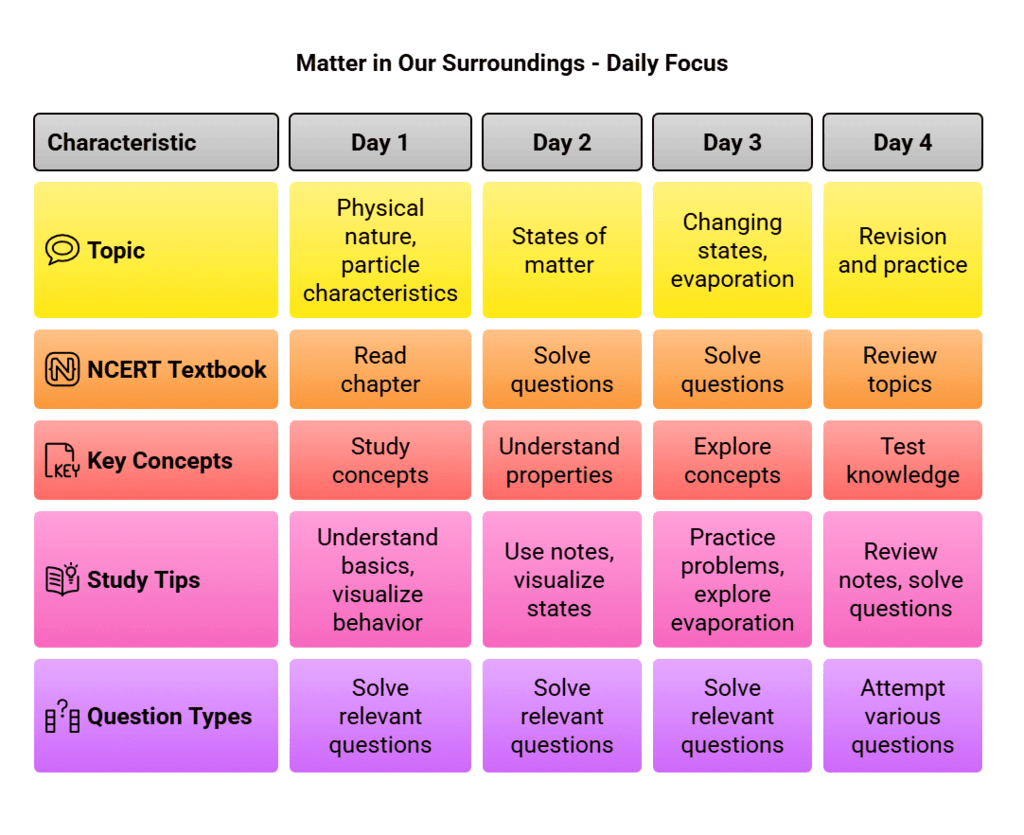4 Days Timetable: Matter in Our Surroundings | Science Class 9 PDF Download
Understanding the physical nature of matter is fundamental to science. This chapter, Matter in Our Surroundings, explores the characteristics of particles of matter, states of matter, and various phenomena related to matter. By following this study plan, you will be well-prepared to excel in your Class 9 Science exams.
Topics to Cover
- Physical Nature of Matter
- Characteristics of Particles of Matter
- States of Matter
- Can Matter Change its State?
- Evaporation

Day 1: Physical Nature of Matter and Characteristics of Particles of Matter
What to cover:
- Begin by reading the NCERT textbook for Matter in Our Surroundings.
- Study the concepts of the physical nature of matter and characteristics of particles of matter.
- Solve relevant NCERT questions.
Study Tips:
- Start your preparation with a clear understanding of the basics. NCERT provides a strong foundation.
- Visualize the behavior of particles in different states of matter.
- Use videos to enhance your understanding of these topics.
Day 2: States of Matter
What to cover:
- Delve into the topic of states of matter.
- Understand the properties and differences between solids, liquids, and gases.
- Solve NCERT questions on this topic.
- Refer to the NCERT Solutions for additional clarity.
Study Tips:
- Use chapter notes for quick revision.
- Make use of mind maps to visualize and remember the states of matter.
- Test your knowledge with practice questions.
Day 3: Changing States of Matter and Evaporation
What to cover:
- Explore the concept of matter changing its state.
- Study the process of evaporation in detail.
- Solve NCERT questions related to this topic.
Study Tips:
- Use worksheets to practice problems related to state changes.
- Explore the topic of evaporation through visual aids.
- Check your understanding with HOTS questions.
Day 4: Revision and Practice
What to cover:
- Review all the topics covered in the past three days.
- Test yourself with past year questions, topic-wise tests, and practice questions.
- Don't forget to attempt HOTS questions, assertion and reason type questions, and case-based questions.
Study Tips:
- Review your notes and highlight important points.
- Solve different types of questions to improve your problem-solving skills.
- Use the provided resources and solutions for additional support.
Remember, your Class 9 Science exams will include various question types, so thorough preparation and practice are essential. Stay consistent and focused in your studies, and you'll be well-prepared to tackle the chapter on "Matter in Our Surroundings."
Here are the links at the end of the study plan, divided into appropriate headers:
Important Links:
- Class 9 Exam
- Science Class 9
- Previous Year Questions: Matter in our surroundings
- Chapter: Matter in Our Surroundings
- Chapter Notes: Matter in our surroundings
- NCERT Textbook for Matter in our surroundings
- NCERT Solutions for Matter in our surroundings
- Worksheet for Matter in our surroundings
- Worksheet Solutions for Matter in our surroundings
Additional Study Resources:
- Short & Long Questions & Answers
- Mindmap: Matter in our surroundings
- Practice Questions: Matter in our surroundings
- HOTS Questions: Matter in our surroundings
- Assertion & Reason Type Questions: Matter in our surroundings
- Case Based Questions: Matter in our surroundings
- Long Questions & Answers: Matter in our surroundings
- Short Questions & Answers: Matter in our surroundings
- Very Short Questions & Answers: Matter in our surroundings
- PPT: Matter in our surroundings
- Short Notes: Matter in our surroundings
- NCERT Exemplar: Matter in our surroundings
Feel free to access these resources to enhance your understanding and preparation for the chapter on "Matter in Our Surroundings" in Class 9 Science.
Good luck with your studies!
|
84 videos|478 docs|60 tests
|
FAQs on 4 Days Timetable: Matter in Our Surroundings - Science Class 9
| 1. What are the physical characteristics of matter? |  |
| 2. What are the three main states of matter? |  |
| 3. How do changes in temperature affect the states of matter? |  |
| 4. What is evaporation and how does it occur? |  |
| 5. Why is it important to understand the properties of matter? |  |

















